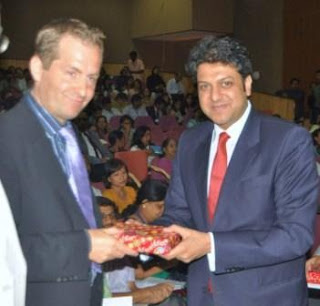AUR, August 6th, 2010: Prof. Christian Henrichs, International Trainer of positive Psychotherapy & Board member of the World Association of Positive Psychotherapy and, Peseschkian Foundation, Germany, discussed the perspectives of Psychotherapy in the 21st century. Peseschkian’s Approach to Psychotherapy in the Time of Globalization. He said, “Positive Psychotherapy will enable a person to relate himself to the past and connect him with future.” According to him, today a person can only be successful if we are connected to the future. If we want to do something we never had before, we will have to do something that we have never done before. According to a renowned scientist, Prof. Peters, “To be successful today, we need to connect ourselves with our brain.” We should be able to relate ourselves to the future rather than our present or past.
It’s very important that we relate to facts. It’s not only important to ace but also very important to look back and learn from our mistakes. Prof. Henrichs conveyed that if anybody goes up to the mountain and decides to climb; the foremost thing needed is the will power and courage. In every problem, learn new depths and new solutions for it. Main idea is that we not only relate ourselves to the problems but also relate to the ability of solving them.
Prof. Henrichs introduced to people the basic capabilities, like to grow or to develop, are required to have in an individual. They are continuous process that helps an individual to move forward and to be concrete. He also highlighted the facts of being an obedient individual. Obedience to oneself and God is one of the highest station that human can ever acquire. For instance, being obedient to an unjust ruler is wrong. We actualize basic capacity at various levels and we are the victims of relationships. Having secondary capabilities like honesty, punctuality, honesty, sincerity and fidelity are needed to cope up our anxiety. He gave an example on how Illness and death of a person is considered in east and west. In west when a person is sick, he would like to rest. He is visited by a few people. Visits are perceived as social control. In east, when a person is ill, the bed is put in the living room. The sick person is the center of attention and is visited by family members, relatives and friends. For visitors to stay away is seen as lack of sympathy. Where in case of death; in west, people ask you to abstain from sympathy calls. They have to deal with very own fare by themselves. Now they must bear so much suffering alone. In east, for between 8-40 days, all the relatives, friends and acquaintances visit the survivors, thus giving a feeling of sincerity “Shared suffering is half the suffering”.
On a visit to China, Henrichs told his students that-“It’s not even enough to give knowledge but it’s also important to use wisdom.” Different people have developed different strategies to cope up with the problems. Balanced model is not only related to concepts but also deals with the basic areas of life.
This entry was posted
on Friday, August 6, 2010
at 3:10 PM
and is filed under
CONFERENCE Psycology
. You can follow any responses to this entry through the
comments feed
.
